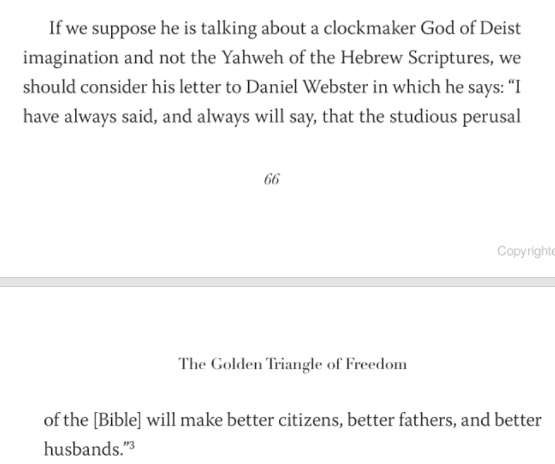In his new book If You Can Keep It, Eric Metaxas provides an overview of early American history in order to remind us what is special about America. In the process, he provides a pithy formula for national success, but he makes significant historical errors and glosses over important facts. One such fact is the involvement of evangelist George Whitefield in introducing slavery to Georgia.
In his chapter on Whitefield (which appears to be summarized without attribution from Thomas Kidd’s excellent book on Whitefield), Metaxas asserts that Whitefield’s preaching was a great equalizer among American social classes. On page 111, he adds:
The egalitarian strains of the Gospel extended to women and blacks as well. Many female preachers were spawned by the revival of the Great Awakening and many African American preachers too. Unlike most of the mainline ministers of his day, Whitefield often spoke to “Negroes” and once remarked that he was especially touched when one of them came to faith. One of them even asked Whitefield, “Have I a soul?” That Whitefield believed he did meant that the Negro was in this most important respect perfectly equal to whites.
Metaxas, Eric (2016-06-14). If You Can Keep It: The Forgotten Promise of American Liberty (p. 111). Penguin Publishing Group. Kindle Edition.
This is a disturbing whitewash of Whitefield’s views and actions relating to African slaves. As Kidd documents in his book (see also this post), Whitefield was “convinced that introducing slavery into Georgia was essential to the colony’s economic prospects…” Prior to Whitefield’s advocacy for slavery, Georgia had banned it. Whitefield himself owned slaves. On March 22, 1751, Whitefield wrote about the need for slavery in Georgia:
As for the lawfulness of keeping slaves, I have no doubt, since I hear of some that were bought with Abraham’s money, and some that were born in his house.—And I cannot help thinking, that some of those servants mentioned by the Apostles in their epistles, were or had been slaves. It is plain, that the Gibeonites were doomed to perpetual slavery, and though liberty is a sweet thing to such as are born free, yet to those who never knew the sweets of it, slavery perhaps may not be so irksome. However this be, it is plain to a demonstration, that hot countries cannot be cultivated without negroes. What a flourishing country might Georgia have been, had the use of them been permitted years ago? How many white people have been destroyed for want of them, and how many thousands of pounds spent to no purpose at all?
Africans are expendable and whites are not.
Yes, Whitefield preached to slaves and expressed pleasure when they converted. However, he also resisted the urging of at least one of this colleagues to reject slavery. Not only did he own slaves, but he used his considerable influence to change the attitudes of Georgia decision makers to allow slavery in the colony.
Whitefield biographer James Gledstone commented in 1871 on Whitefield’s efforts to bring slavery to Georgia:
How complete and miserable a failure was the attempt to unite slavery and Christianity will be seen by and by. Meanwhile we think of the orphans being habituated to look upon Negroes as a servile race, of their growing to manhood and womanhood educated in the ideas of slaveholders, and of their being able to throw over all the abominations of the system, the reputation of a philanthropist so humane and a saint so sincere and so holy as was George Whitefield; neither can we forget that every man who owned a slave would be able to justify it by Whitefield’s example.
This reminds me of David Barton’s whitewash of Thomas Jefferson on slavery.
It is beyond absurd for Metaxas to write, “The egalitarian strains of the Gospel extended to women and blacks as well.” In what universe can Whitefield’s approach to Africans be construed as regarding them as “perfectly equal to whites?”
Apparently, Whitefield worship is a matter of great importance to Metaxas. He needs Whitefield to fill the role of the great Christian reason we had the revolution. About Whitefield, Metaxas says:
We might also say that providence brought them [unity and self-government] into existence through the life and work of a single man, very little known to us today. We are talking about the life and work of the man named George Whitefield, without whom the United States simply could not have come into being.
Metaxas, Eric (2016-06-14). If You Can Keep It: The Forgotten Promise of American Liberty (p. 77). Penguin Publishing Group. Kindle Edition.
Did providence also bring about slavery in Georgia?
Apparently, Metaxas needs Whitefield to be larger than life in order to bring God into the founding. At the close of the chapter on Whitefield, Metaxas says:
When we take the full measure of Whitefield’s role in creating what would become the United States, who can help but wonder whether our history is one in which God himself— and if not God, then at least those who are motivated by the idea of God and all it portends— has played a central role?
Metaxas, Eric (2016-06-14). If You Can Keep It: The Forgotten Promise of American Liberty (p. 114). Penguin Publishing Group. Kindle Edition.
If you want a book to delight you with pleasantries and clever phrasing, this one could work. However, if you want accurate and honest history throughout, this is not the book for you.
*In my Kindle copy, there are only 7 end notes. I could be wrong but it seems like Metaxas owes a large debt to Kidd’s book on Whitefield.
